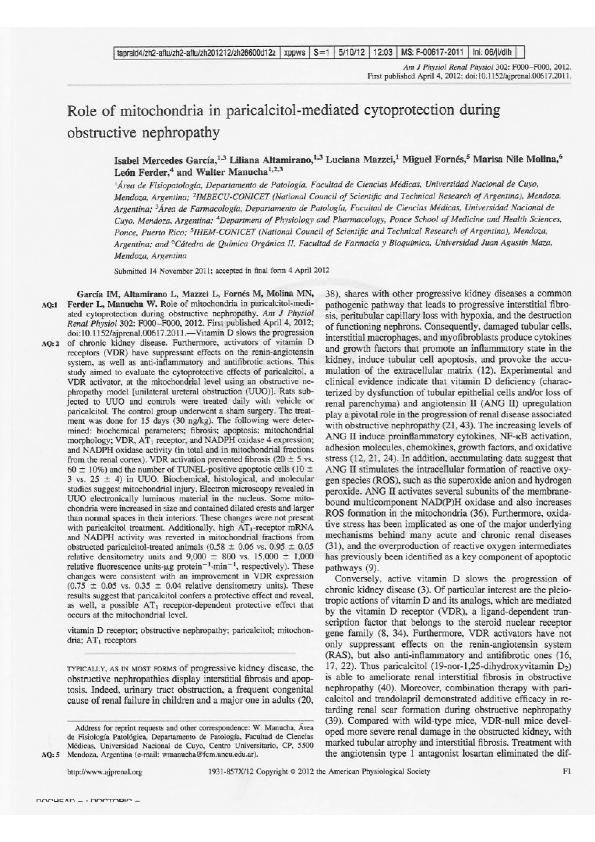Mostrar el registro sencillo del ítem
dc.contributor.author
García, Isabel Mercedes

dc.contributor.author
Altamirano, Berta Liliana

dc.contributor.author
Mazzei, Luciana Jorgelina

dc.contributor.author
Fornes, Miguel Walter

dc.contributor.author
Molina, Marisa Nile
dc.contributor.author
Ferder, León
dc.contributor.author
Manucha, Walter Ariel Fernando

dc.date.available
2019-08-21T23:26:31Z
dc.date.issued
2012-04-04
dc.identifier.citation
García, Isabel Mercedes; Altamirano, Berta Liliana; Mazzei, Luciana Jorgelina; Fornes, Miguel Walter; Molina, Marisa Nile; et al.; Role of mitochondria in paricalcitol-mediated cytoprotection during obstructive nephropathy; American Physiological Society; American Journal Of Physiology-renal Physiology; 302; 12; 4-4-2012; 1565-1605
dc.identifier.issn
1931-857X
dc.identifier.uri
http://hdl.handle.net/11336/81956
dc.description.abstract
Vitamin D slows the progression of chronic kidney disease. Furthermore, activators of vitamin D receptors (VDR) have suppressant effects on the renin-angiotensin system, as well as anti-inflammatory and antifibrotic actions. This study aimed to evaluate the cytoprotective effects of paricalcitol, a VDR activator, at the mitochondrial level using an obstructive nephropathy model [unilateral ureteral obstruction (UUO)]. Rats subjected to UUO and controls were treated daily with vehicle or paricalcitol. The control group underwent a sham surgery. The treatment was done for 15 days (30 ng/kg). The following were determined: biochemical parameters; fibrosis; apoptosis; mitochondrial morphology; VDR, AT(1) receptor, and NADPH oxidase 4 expression; and NADPH oxidase activity (in total and in mitochondrial fractions from the renal cortex). VDR activation prevented fibrosis (20 ± 5 vs. 60 ± 10%) and the number of TUNEL-positive apoptotic cells (10 ± 3 vs. 25 ± 4) in UUO. Biochemical, histological, and molecular studies suggest mitochondrial injury. Electron microscopy revealed in UUO electronically luminous material in the nucleus. Some mitochondria were increased in size and contained dilated crests and larger than normal spaces in their interiors. These changes were not present with paricalcitol treatment. Additionally, high AT(1)-receptor mRNA and NADPH activity was reverted in mitochondrial fractions from obstructed paricalcitol-treated animals (0.58 ± 0.06 vs. 0.95 ± 0.05 relative densitometry units and 9,000 ± 800 vs. 15,000 ± 1,000 relative fluorescence units·μg protein(-1)·min(-1), respectively). These changes were consistent with an improvement in VDR expression (0.75 ± 0.05 vs. 0.35 ± 0.04 relative densitometry units). These results suggest that paricalcitol confers a protective effect and reveal, as well, a possible AT(1) receptor-dependent protective effect that occurs at the mitochondrial level.
dc.format
application/pdf
dc.language.iso
eng
dc.publisher
American Physiological Society

dc.rights
info:eu-repo/semantics/openAccess
dc.rights.uri
https://creativecommons.org/licenses/by-nc-sa/2.5/ar/
dc.subject
Vitamin D Receptor
dc.subject
Obstructive Nephropathy
dc.subject
Paricalcitol
dc.subject
Mitochondria
dc.subject
At1 Receptors
dc.subject.classification
Enfermedades Infecciosas

dc.subject.classification
Ciencias de la Salud

dc.subject.classification
CIENCIAS MÉDICAS Y DE LA SALUD

dc.title
Role of mitochondria in paricalcitol-mediated cytoprotection during obstructive nephropathy
dc.type
info:eu-repo/semantics/article
dc.type
info:ar-repo/semantics/artículo
dc.type
info:eu-repo/semantics/publishedVersion
dc.date.updated
2019-06-10T21:42:44Z
dc.journal.volume
302
dc.journal.number
12
dc.journal.pagination
1565-1605
dc.journal.pais
Estados Unidos

dc.journal.ciudad
Bethesda
dc.description.fil
Fil: García, Isabel Mercedes. Universidad Nacional de Cuyo. Facultad de Ciencias Médicas; Argentina
dc.description.fil
Fil: Altamirano, Berta Liliana. Universidad Nacional de Cuyo. Facultad de Ciencias Médicas; Argentina
dc.description.fil
Fil: Mazzei, Luciana Jorgelina. Consejo Nacional de Investigaciones Científicas y Técnicas. Centro Científico Tecnológico Conicet - Mendoza. Instituto de Medicina y Biología Experimental de Cuyo; Argentina
dc.description.fil
Fil: Fornes, Miguel Walter. Consejo Nacional de Investigaciones Científicas y Técnicas. Centro Científico Tecnológico Conicet - Mendoza. Instituto de Histología y Embriología de Mendoza Dr. Mario H. Burgos. Universidad Nacional de Cuyo. Facultad de Ciencias Médicas. Instituto de Histología y Embriología de Mendoza Dr. Mario H. Burgos; Argentina
dc.description.fil
Fil: Molina, Marisa Nile. Universidad "Juan Agustín Maza". Facultad de Farmacia y Bioquímica; Argentina
dc.description.fil
Fil: Ferder, León. Ponce School Of Medicine; Puerto Rico
dc.description.fil
Fil: Manucha, Walter Ariel Fernando. Universidad Nacional de Cuyo. Facultad de Ciencias Médicas; Argentina. Consejo Nacional de Investigaciones Científicas y Técnicas. Centro Científico Tecnológico Conicet - Mendoza. Instituto de Medicina y Biología Experimental de Cuyo; Argentina
dc.journal.title
American Journal Of Physiology-renal Physiology

dc.relation.alternativeid
info:eu-repo/semantics/altIdentifier/doi/https//dx.doi.org/10.1152/ajprenal.00617.2011
dc.relation.alternativeid
info:eu-repo/semantics/altIdentifier/url/https://www.physiology.org/doi/full/10.1152/ajprenal.00617.2011
Archivos asociados
